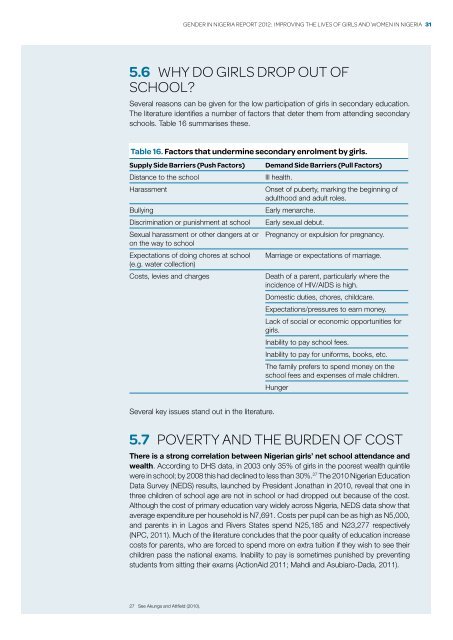Gender in niGeria report 2012 - Economic Commission for Africa
Gender in niGeria report 2012 - Economic Commission for Africa
Gender in niGeria report 2012 - Economic Commission for Africa
Create successful ePaper yourself
Turn your PDF publications into a flip-book with our unique Google optimized e-Paper software.
<strong>Gender</strong> <strong>in</strong> Nigeria Report <strong>2012</strong>: Improv<strong>in</strong>g the Lives of Girls and Women <strong>in</strong> Nigeria 31<br />
5.6 Why do girls drop out of<br />
school?<br />
Several reasons can be given <strong>for</strong> the low participation of girls <strong>in</strong> secondary education.<br />
The literature identifies a number of factors that deter them from attend<strong>in</strong>g secondary<br />
schools. Table 16 summarises these.<br />
Table 16. Factors that underm<strong>in</strong>e secondary enrolment by girls.<br />
Supply Side Barriers (Push Factors)<br />
Distance to the school<br />
Harassment<br />
Bully<strong>in</strong>g<br />
Discrim<strong>in</strong>ation or punishment at school<br />
Sexual harassment or other dangers at or<br />
on the way to school<br />
Expectations of do<strong>in</strong>g chores at school<br />
(e.g. water collection)<br />
Costs, levies and charges<br />
Demand Side Barriers (Pull Factors)<br />
Ill health.<br />
Onset of puberty, mark<strong>in</strong>g the beg<strong>in</strong>n<strong>in</strong>g of<br />
adulthood and adult roles.<br />
Early menarche.<br />
Early sexual debut.<br />
Pregnancy or expulsion <strong>for</strong> pregnancy.<br />
Marriage or expectations of marriage.<br />
Death of a parent, particularly where the<br />
<strong>in</strong>cidence of HIV/AIDS is high.<br />
Domestic duties, chores, childcare.<br />
Expectations/pressures to earn money.<br />
Lack of social or economic opportunities <strong>for</strong><br />
girls.<br />
Inability to pay school fees.<br />
Inability to pay <strong>for</strong> uni<strong>for</strong>ms, books, etc.<br />
The family prefers to spend money on the<br />
school fees and expenses of male children.<br />
Hunger<br />
Several key issues stand out <strong>in</strong> the literature.<br />
5.7 Poverty and the burden of cost<br />
There is a strong correlation between Nigerian girls’ net school attendance and<br />
wealth. Accord<strong>in</strong>g to DHS data, <strong>in</strong> 2003 only 35% of girls <strong>in</strong> the poorest wealth qu<strong>in</strong>tile<br />
were <strong>in</strong> school; by 2008 this had decl<strong>in</strong>ed to less than 30%. 27 The 2010 Nigerian Education<br />
Data Survey (NEDS) results, launched by President Jonathan <strong>in</strong> 2010, reveal that one <strong>in</strong><br />
three children of school age are not <strong>in</strong> school or had dropped out because of the cost.<br />
Although the cost of primary education vary widely across Nigeria, NEDS data show that<br />
average expenditure per household is N7,691. Costs per pupil can be as high as N5,000,<br />
and parents <strong>in</strong> <strong>in</strong> Lagos and Rivers States spend N25,185 and N23,277 respectively<br />
(NPC, 2011). Much of the literature concludes that the poor quality of education <strong>in</strong>crease<br />
costs <strong>for</strong> parents, who are <strong>for</strong>ced to spend more on extra tuition if they wish to see their<br />
children pass the national exams. Inability to pay is sometimes punished by prevent<strong>in</strong>g<br />
students from sitt<strong>in</strong>g their exams (ActionAid 2011; Mahdi and Asubiaro-Dada, 2011).<br />
27 See Akunga and Attfield (2010).

















